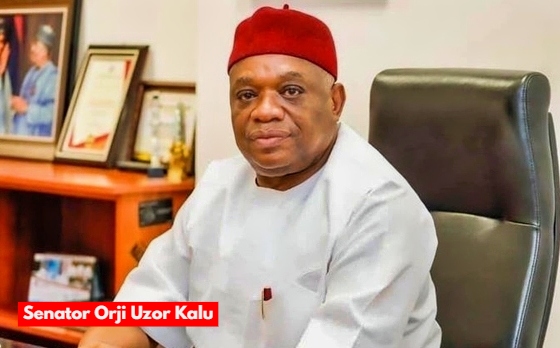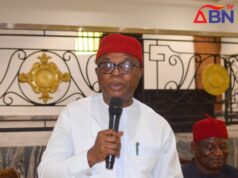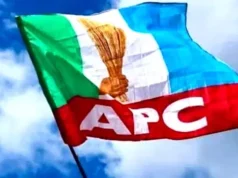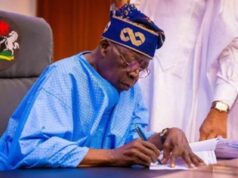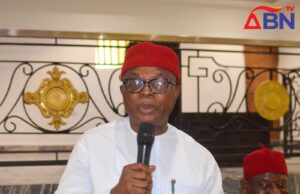Since the announcement of the All Progressives Congress (APC) decision to zone the leadership positions in the two arms of the 10th National Assembly, the Senate and House of Representatives, to specific individual candidates, protests have enveloped the polity. Those favoured by the party selections, were Sen. Godswill Akpabio, for Senate President. and Sen. Jibrin Barau, for Deputy Senate President. Others are Tajudeen Abbas for the post of Speaker of the House of Representatives, and Ben Kalu for Deputy Speaker. The APC leadership and the President-Elect are on the receiving end of these protests. Following a recent protest led by AbdullAziz Yari, Orji Uzor Kalu and other stalwarts and APC aspirants to the office of the national chairman, the party was forced to recant and promised to rejig the zoning arrangement.
Many important stakeholders of the APC and aspirants to the National Assembly positions appear to have been brushed aside because of the insistence of the party to support particular names, instead of allowing the zones to make further consultations as to who should be presented for final voting by National Assembly members.
In the case of the Senate Presidency position, there is a serious feeling of marginalization in the South-East geopolitical zone. The incumbent Chief Whip of the Senate and former Governor of Abia State had written to the 109 Senators-elect to indicate his interest to run for the Senate President’s seat. Sen. Osita Izunaso is also reported to be in the race. He was a national organizing secretary of the APC. As it stands now, some aspirants for the position of Senate President from the North, including Sen. Yari, former governor of Zamfara State, and Sen. Musa Sani from Niger State, are seriously in contention. However, with proper dialogue and consultations between the southern and northern senators, it is possible that the aspirants from the North may support a South-East aspirant to emerge, at least to ensure religious balancing in the polity, given the fact that the President-Elect and the Vice-President-Elect are Muslims. A Christian head of the National Assembly is required to strike a balance, going forward.
READ ALSO: Speakership Battle: Doguwa, Makki, Raheem Withdraw From Race, Endorse Abbas
More importantly, there is a strong groundswell of opinion that the Nigerian people are eager to have an independent parliament, one that will not be at the beck and call of the Presidency. Many Nigerians believe that qualitative separation of powers will put the executive arm on its toes and compel it to serve the interests of the people positively. What is needed is a robust legislative engagement that works for all groups and tendencies within the polity.
Related to the above vision of qualitative governance based on legislative autonomy is the need for a balanced power-sharing framework, rooted in social justice and equity, which constitute the intricate forms of democratic balancing needed for national stability. A public affairs analyst, Dr. Sam Amadi, put it more succinctly when he argued that: “for countries with deep cleavages, you need to create social trust through power-sharing to be able to stabilize democracy in such a plural society.”
The idea that power-sharing in a volatile system such as ours should be based solely on the voting pattern of the geopolitical zones is a defeatist and self-glorifying argument. After all, the sharing of oil resources in Nigeria’s monolithic federation was never based on the equitable contribution of resources from the diverse power blocs that make up the federation. The oil resources in Nigeria are located in southern Igboland and the Igbo have never discriminated against other zones having their fair share of those resources. The federating units are the original and primary stakeholders in the Nigerian state project.
Even when viewed more critically, the South East has shown greater tendency in embracing the APC than the South-South zone. Two of the governors in the zone are in APC, which cannot be said of the South-South.
Secondly, the political history of Nigeria has been woven around the doctrine of the tripod, made of the three major ethnic nationalities. Efforts by past governments to undermine one of the tripodal foundations (the Igbo) led to unfathomable crises. That is not to say that minority ethnic groups should be ignored. The majority should have their way while the minority should have their say.
Many patriotic Nigerians were disturbed that the out-going administration of PMB deliberately embarked on the marginalization of the Igbo, based on their evil policy of “97%/5%”, which was enunciated to punish the South East for not voting for the APC presidential candidate in 2015. What followed that cruel policy was a mass uprising from the youths of the region. Later on, one thing led to the other and the South East became part of the mass violence in Nigeria. Throughout his tenure, Buhari never succeeded in squarely dealing with the South East situation because of the wrong mindset and ill-digested strategies. It would seem that the APC under the President-Elect, Bola Ahmed Tinubu, is yet to learn anything from Buhari’s failures.
Granted that all the regions are enmeshed in violence and terrorism, such as the Boko Haram insurgency (North East), banditry (North West), Fulani herdsmen’s massacres (North Central), the Sunday Igboho/Ganiyu Adams-led Oduduwa struggles (South West) and the Niger Delta Agitators (South-South), it is instructive that only the self-determination struggles inspired by the Indigenous People of Biafra (IPOB) constitutes the most dangerous and profound agitation geared towards the creation of an independent and autonomous republic out of the chaotic Nigerian federation. Yet, Nigerian rulers behave as if they care less about how to tackle the problems, even when the IPOB leader, Nnamdi Kanu, is still in detention.
Brushing aside the Igbo question and continuing with new forms of marginalization against Ndigbo can only bolster the heroism of those fighting for self-determination for a mega-ethnic nationality like the Igbo with over 60 million people as its population.
These anti-Igbo posturings cannot wish away the Igbo problem neither do they translate to Igbo conquest in any form or shape. It can only mean that such a stalemated situation would continue to hamper the progress of the Nigerian nation. After all, have the Igbo not survive Buhari’s antagonistic policies? They survived all the man-made machinations motivated by the height of anti-Igbo campaigns such as the ignoble quit notices and Python Dance of August/September 2017.
A more creative political class would have shown serious concern and taken steps to douse the tension generated by the mythical charter of ethnic prejudices against the Igbo, instead of adding fuel to an already burning inferno.
It is important now to take urgent steps to nip the immediate sources of discontent in the bud as the Tinubu administration is about to take off, to avoid the ugly miscalculations of the past. The APC and Tinubu should change tactics now and do the needful. And that is where the issue of Sen. Orji Uzor Kalu comes in. He is a credible alternative to Akpabio, based on the intensity of opposition that has greeted the APC announcement of Akpabio as its choice for the leadership of the 10th Senate. Even the South-South Former Legislators Forum has taken note of Akpabio’s rejection and is now searching for his replacement.
On the 7th of May, the South East senators met in Abuja to reject Akpabio’s nomination by the party and to announce their support for one of their members as the next Senate President. Their spokesman was Sen. Ifeanyi Ubah of the Young Progressives Party (YPP). Just as the South East senators were meeting, it was reported that 37 APC senators had resolved to rally against Akpabio’s bid for the Senate Presidency. The Arewa Consultative Forum (ACF) has stated its opposition to the choice of Akpabio. A top member of the forum, Musa Saidu, said that “endorsing Akpabio for the job would spell doom for the North as Akpabio was not known to be friendly with the North”.
The PDP has equally voiced its decision to oppose Akpabio, citing the treacherous circumstances under which he left the party and decamped to APC in 2019 just as the incumbent Senate President, Sen. Ahmed Lawan, is reported to have vowed that Akpabio must be stopped because of his betrayal of his colleagues on issues relating to the NDDC when he was the Minister of Niger Delta Affairs.
In the communique released by the South-East senators after their Abuja meeting, they called on the President-Elect, Tinubu, to address the outcry of marginalization by the South East geopolitical zone and the entire Igbo race. The communique, read by Sen. Ubah, and signed by the South East senators-elect, said that “accepting Mr. Akpabio as Senate President amounts to marginalization of the people of the South East region of the country”. They called on Tinubu to drop Akpabio and stop the politics of marginalization and endorse a candidate from the South East as the next Senate President on the ground that the region had been denied the Presidency of the country since 1966.
In the face of the relentless opposition against the party’s selection, which is now completely rejected by Nigerians, the emerging coalition for a new leadership of the 10th National Assembly and other patriotic Nigerians should step up their game and consolidate their gains so far. A solid integration of independent-minded legislators cutting across the Senate and the House of Representatives is required to rescue the legislative institution from being muzzled by the neo-fascist elements in our midst. The current movement comprising the likes of Orji Uzor Kalu, AbdulAziz Yari, Muktar Aliyu Betara, Ado Doguwa and a host of other courageous legislators should be consolidated and sustained.
In a letter to his colleagues announcing his candidature for the 10th Senate Presidency, Sen. Kalu articulated his legislative agenda made up of six priorities, namely: Economic Reforms/Economic Growth, Constitutional/Electoral Reforms, National Security, Improved Social Conditions and Welfare of the Citizenry, Efficient and Effective National Assembly and Improved Global Influence based on Effective Foreign Policy. This is about the first time someone running for legislative leadership in contemporary times in Nigeria would signpost such a deep and visionary agenda.
Sen. Orji Uzor Kalu, 63, is not a newcomer to Nigerian politics. He is a pan-Nigerian political player and trendsetter of sorts. He is a ranking senator representing Abia North in the Senate and was re-elected to the Senate in the last general election.
At age 26, he became the youngest Nigerian to receive the National Merit Award from former Military President, Gen. Ibrahim Babangida, in 1986. He was elected into the House of Representatives at 31 in 1992. Kalu was one of the founding members and financiers of PDP. He was elected twice as Governor of Abia State (1999-2007). He is an astute and successful businessman and publisher of newspaper titles . He owns the Daily Sun and New Telegraph newspapers in Nigeria and Slok Airlines. Kalu was chairman, Borno State Water Board, and former chairman of the defunct Cooperative and Commerce Bank.
In 2003, when he fell out with former President Olusegun Obasanjo, Kalu founded the Progressive People’s Alliance (PPA) and left the PDP. The PPA won two gubernatorial elections in Abia State (2003 and 2007) and was also used to elect Ikedi Ohakim as the Governor of Imo State in 2007. The PPA had in its ranks veteran ideologues like Comrade Sen. Uche Chukwumerije of blessed memory.

